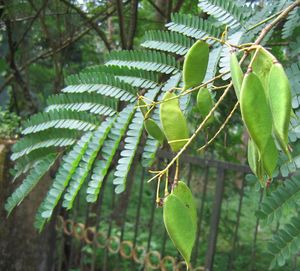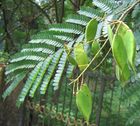Note: This is a project under development. The articles on this wiki are just being initiated and broadly incomplete. You can Help creating new pages.
Caesalpinia sappan - Pathanga
Sappan Wood is a small thorny tree. It is having 15-25 cm in trunk diameter with a few prickly branches. Biancaea sappan is a prickly, shrubby tree that can grow up to 20 metres tall, but is usually smaller.
Contents
- 1 Uses
- 2 Parts Used
- 3 Chemical Composition
- 4 Common names
- 5 Properties
- 6 Habit
- 7 Identification
- 8 List of Ayurvedic medicine in which the herb is used
- 9 Where to get the saplings
- 10 Mode of Propagation
- 11 How to plant/cultivate
- 12 Commonly seen growing in areas
- 13 Photo Gallery
- 14 References
- 15 External Links
Uses
Wounds, Tuberculosis, Dysentery, Curing liver disorders, Skin eruptions, Pimples, Diarrhea.
Parts Used
Chemical Composition
tectorigenin, sappanone, 3-deoxysappanone, sappanchalcone, 3-deoxysappanchalcone[1]
Common names
| Language | Common name |
|---|---|
| Kannada | Sappange |
| Hindi | Patamg, Bakam |
| Malayalam | Chappannam, Sappannam |
| Tamil | Sappamgu, Patamgam |
| Telugu | Bakaruchakka |
| Marathi | NA |
| Gujarathi | NA |
| Punjabi | NA |
| Kashmiri | NA |
| Sanskrit | Patrangah, Patangah |
| English | Sappan Wood, Brazil wood |
Properties
Reference: Dravya - Substance, Rasa - Taste, Guna - Qualities, Veerya - Potency, Vipaka - Post-digesion effect, Karma - Pharmacological activity, Prabhava - Therepeutics.
Dravya
Rasa
Tikta (Bitter), Kashaya (Astringent), Madhura (Sweet)
Guna
Ruksha (Dry)
Veerya
Sheeta (cold)
Vipaka
Katu (Pungent)
Karma
Kapha, pitta
Prabhava
Habit
Identification
Leaf
| Kind | Shape | Feature |
|---|---|---|
| Simple | double-compound | alternately arranged, 20-45 cm long, 10-20 cm broad, with 8-16 pairs of up to 20 cm long side-stalks. Side-stalks are prickles at the base and with 10-20 pairs of oblong |
Flower
| Type | Size | Color and composition | Stamen | More information |
|---|---|---|---|---|
| Unisexual | 2-3 cm long | Yellow | 5-20 | Flowers Season is June - Augustand Stamens are waxy-white, filaments densely woolly at the base |
Fruit
| Type | Size | Mass | Appearance | Seeds | More information |
|---|---|---|---|---|---|
| woody pods | The heartwood which is used in medicine is light yellow when freshly cut, but it quickly changes to red | compressed with a hard recurved short beak | 3-4 seeds | {{{6}}} |
Other features
List of Ayurvedic medicine in which the herb is used
- Vishatinduka Taila as root juice extract
Where to get the saplings
Mode of Propagation
How to plant/cultivate
Sappanwood succeeds in semi-arid to moist tropical regions[3]
Commonly seen growing in areas
Secondary forest, Near roadsides, Forest-edges, Limestone hills.
Photo Gallery
References
External Links
- Ayurvedic Herbs known to be helpful to treat Wounds
- Ayurvedic Herbs known to be helpful to treat Tuberculosis
- Ayurvedic Herbs known to be helpful to treat Dysentery
- Ayurvedic Herbs known to be helpful to treat Curing liver disorders
- Ayurvedic Herbs known to be helpful to treat Skin eruptions
- Ayurvedic Herbs known to be helpful to treat Pimples
- Ayurvedic Herbs known to be helpful to treat Diarrhea
- Herbs with Dried folaige used in medicine
- Herbs with Whole herb used in medicine
- Herbs with common name in Kannada
- Herbs with common name in Hindi
- Herbs with common name in Malayalam
- Herbs with common name in Tamil
- Herbs with common name in Telugu
- Herbs with common name in Sanskrit
- Herbs with common name in English
- Habit - Tree
- Index of Plants which can be propagated by Seeds
- Index of Plants which can be propagated by Cuttings
- Herbs that are commonly seen in the region of Secondary forest
- Herbs that are commonly seen in the region of Near roadsides
- Herbs that are commonly seen in the region of Forest-edges
- Herbs that are commonly seen in the region of Limestone hills
- Herbs
- Ayurvedic herbs that don't have seed photos
- Fabaceae







